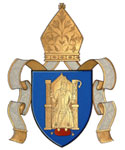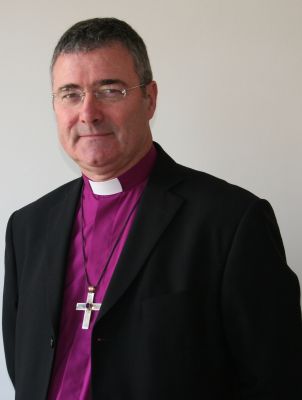 |
 |
News
A Note from the Bishop: April
Dear Friends

Something a little bit different...
Towards the end of last year I was invited to St. Anne's cathedral in Belfast to speak at the launch of a book which had been edited by an old friend of mine. In one sense it was a rather 'rarefied' book of sermons preached in Belfast by an eighteenth century parson. In another sense it was anything but 'rarefied' as the preacher tried to apply the scripture readings to the lives of the ordinary folk around him. The original manuscripts of the sermons had been found by someone who was sorting through some old documents in a store room and they are the largest surviving set of sermons preached by an ordinary Church of Ireland clergyman of the eighteenth century.
Although I studied history at university and have tried to keep up some reading on that subject, I am by no means an expert on eighteenth century Ireland. I am pretty certain that the only reason I was asked to launch the book was because the editor (Professor Raymond Gillespie of the National University of Ireland) and I had been in the same class all the way through primary school, grammar school and for four years at university- eighteen years in all.
Although our paths had crossed a little since we graduated in 1978 I hadn't seen much of Ray, but had read a fair number of his many publications. When we met briefly on the evening of the launch he asked me 'Well, what does a professional make of them?' I assume he meant a professional clergyman rather than a professional historian.
I was able to say to him that perhaps the most remarkable feature of the sermons was that (with a few adjustments to the old fashioned language) they could have been preached today and been found useful. We modern people often think of ourselves as uniquely circumstanced and very different from our ancestors. In some ways that is true but every generation has its joys, trials, uncertainties and achievements.
In the Belfast of his day James Saurin had particular problems to overcome. As his name would suggest he came form a distinguished Huguenot family. Both his father and grandfather were clergymen-scholars and he too was very well read. However he wore his learning lightly and didn't show it off from the pulpit. In his day Belfast was an overwhelmingly Presbyterian city with a tiny Catholic population and about two hundred members of the Church of Ireland, all of whom were his parishioners. The services in the parish Church wouldn't have looked out of place today in the Diocese of Clogher. One practice which would look a bit odd today was of taking off putting on a black Geneva gown to go into the pulpit to preach.
Despite horror stories to the contrary, clergymen did not preach for an hour in those days. I reckon that most of his sermons would have lasted about 15-20 minutes. He wrote them out more or less in full and used them many times throughout his ministry - in a few cases about twenty times. This was at a time when there were relatively few books and people remembered what they heard with much greater accuracy than we do today.
The fact that the Church of Ireland population were in such a minority certainly didn't inhibit James Saurin from making his mark on the civic and religious life of the city. He was on many charitable boards and was in every way an exemplary clergyman - well known in the city and with his finger on the pulse of what was going on. That he knew his parishioners very well is clear from the application of his preaching to their daily lives.
He lived and ministered during the first period of what is sometimes known as the 'Great Awakening' in Great Britain and Ireland when the Wesley's and George Whitfield were preaching in the open air often to thousands of people at a time. However Saurin seems to have been untouched by this Evangelical movement possibly because he was already someone who stressed the idea of 'the religion of the heart'. Many of his sermons were critical of formal, cold conventional religion and he frequently urged his congregations to open both their hearts and not just their minds to the Holy Spirit. However he was also frequently critical of a zeal that was without knowledge and expected people to be able to give an account of the faith that was in them. He would have been interesting to listen to on a Sunday morning and in the modern church it would have been encouraging to see his name appear at a Board of Nomination.
He seems to have had a couple of rather odd ideas. For instance he believed that the only reason why the Church of Ireland did not baptise infants by total immersion was because of the cold climate and his own baptismal practise seems to have been to pour water over the baby's face rather than his/her head. I don't think that would go down well today.
Finally and contrary to today, Easter was a bigger feast than Christmas in eighteenth century Ireland and Saurin's Easter sermons were preached to his largest congregations. Although it may not be a very 'spiritual' motive, at least part of the reason for the bigger crowds was because it must have been bitterly cold in December and rather more comfortable in a big unheated Church in March or April. I hope it was (and is) also because the great feast of the Resurrection is the source of the greatest happiness, hope and peace in his world and in ours.
+John